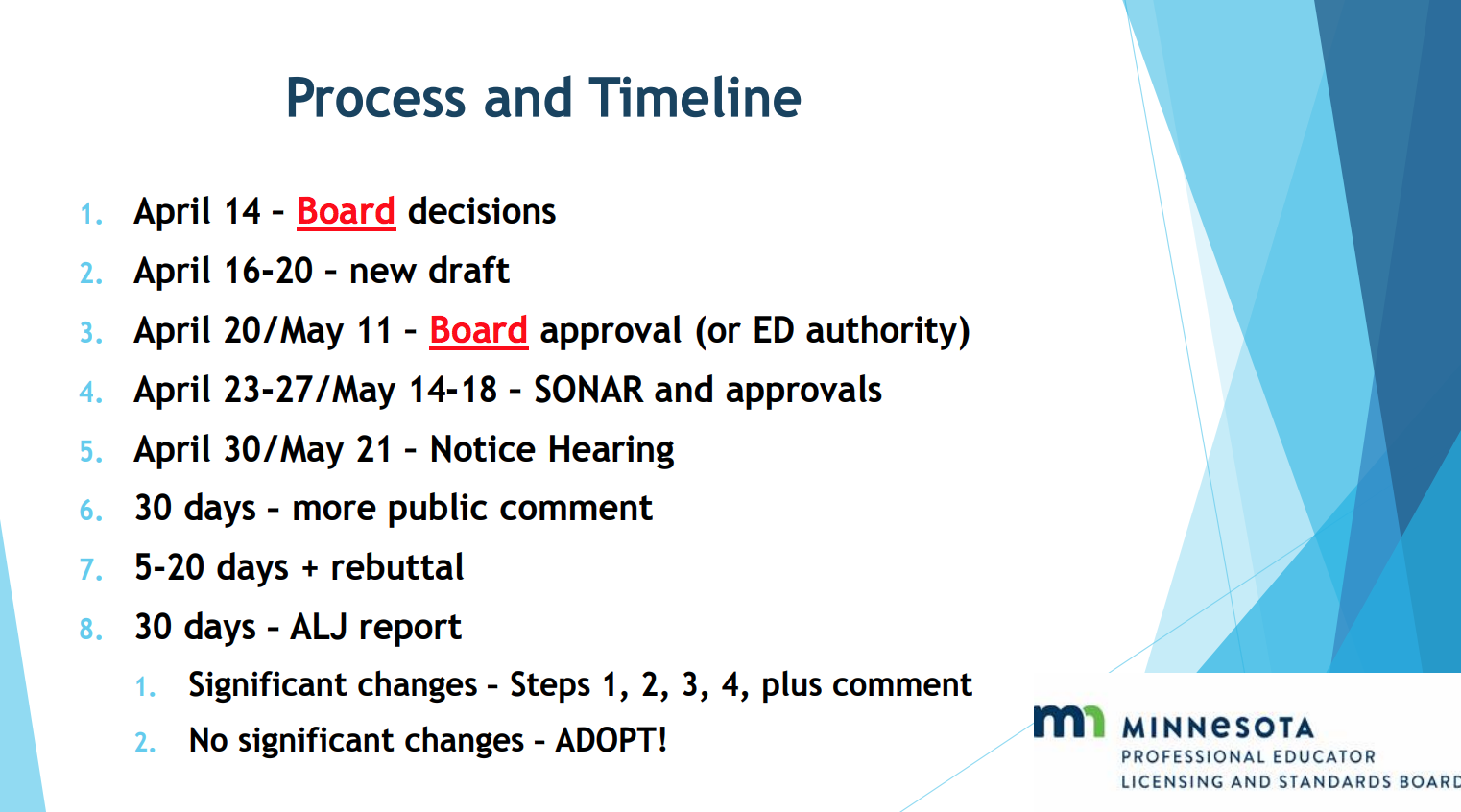On Friday, April 20, the Professional Educator Licensing and Standards Board (PELSB) met to do final interviews for the three finalists for the executive director position, as well as to go over the new rule draft. The day prior, the three finalists had answered questions that had been provided by the public. The three finalists were:
Jennifer Cherry , Director of Student Services for Anoka-Hennepin School DistrictPaula Cole , Minneapolis Public School Teacher, Richfield School Board Member, and Founder of Parents for Excellence AcademyAlex Liuzzi , Interim Executive Director of PELSB
After interviewing the candidates, PELSB deliberated and ultimately voted 8-2 to move Alex Liuzzi forward in the hiring process to become the permanent Executive Director. This post will go over their deliberations, the new rule draft, and the newest timeline for rulemaking.
Didn’t PELSB Already Search for an Executive Director?
This is the second Executive Director search for PELSB. In their first search, PELSB received 12 applications and narrowed it down to three finalists—Kevin Dahle, Paula Foley, and Anne Soto. However, after the final interviews in February, PELSB decided they didn’t want to move any candidate forward and reopened the search.
After this decision, Jim Miklausich, head of the PELSB committee tasked with leading the search, said in a MinnPost interview, “I think the longer we discussed the candidates, the more it became clear that we felt like these were good people, they all had great qualities. At the same time, nobody had the complete set we were looking for.”
Who Were the Three Finalists?
During the second search, PELSB received many more applications and several PELSB members indicated their satisfaction with the final candidates. When deliberating about which of the final candidates to select for Executive Director, the PELSB members quickly decided to narrow it down to two—Alex Liuzzi and Paula Cole.
While they were impressed with Cherry’s experiences working with a wide variety of stakeholders and managing conflict, there was concern over whether she was qualified for the legislative responsibilities required of the executive director and her lack of understanding around the urgency of the rulemaking process and timeline.
When discussing the final two candidates, several of the PELSB members commented on Cole’s clear passion and dedication to educational equity and social justice, as well as her own relevant experience with going through the teacher licensure process and starting her teaching career as a community expert. Further, many were impressed with her work founding Parents for Excellence Academy, which brings teacher-led parent workshops to schools where parents learn to become better education advocates for their children, and her work with helping to create a board policy for community comment.
With regard to Liuzzi, the vast majority of the PELSB members were incredibly impressed with his experience as a former educator, teacher specialist for the former Board of Teaching, as well as the work he has done as the interim executive director. Further, several of the members brought up his extensive legislative experience, knowledge of the rulemaking process, and his vision to help PELSB with promoting alternative teacher preparation pathways and increase teachers of color.
In the end, eight of the ten present PELSB members voted to move Liuzzi forward in the hiring process for the permanent Executive Director position.
Some of the Changes in New Rule Draft
After PELSB chose their new Executive Director, they switched focus to some of the changes in the new rule draft, which provides clarity around statute. As EE’s previously written, two of the biggest areas of contention in the original rule draft were around cultural competency and requiring mentorship for Tier 1 and Tier 2 teachers. Some of the biggest changes in the new rule draft are:
- Cultural Competency: Almost everything was kept from the original rule draft. However, “religious diversity” was added to the list of topics that PELSB contends must be included in cultural competency training. They also changed the “knowledge and understanding” language in the previous draft, to language that was more aligned to professional growth and development.
- Mentorship: With regard to mentorship, the new rule draft maintains the mentorship requirement for Tier 1 licensed teachers for renewal. However, they made mentorship and licensure renewal for Tier 2, Tier 3, and Tier 4 teachers more aligned to 122A.40.
- Tier 3 “Alternative Pathway”: Removed requirement that, for renewal, a teacher must demonstrate to PELSB that the standards of effective practice have been met and kept only the requirements listed in statute.
- Related Services: One of the biggest areas of change in the new rule draft pertains to related services. When the new teacher licensure legislation was written, related service licenses were unintentionally not addressed. The first rule draft attempted to address what was missing, but it fell short. The new rule draft added ten more pages in order to accommodate these changes.
There were still some concerns from some PELSB members that, even with some of these changes, that the new draft is overreach. However, Liuzzi pointed out if that is the case, the administrative law judge would simply tell PELSB if they needed to cut or amend those sections.
What’s Next with Rulemaking?
After Governor Dayton approves the Statement of Need and Reasonableness (SONAR), PELSB plans to post a Notice of Hearing on April 30. After the Notice of Hearing is posted, there will be a hearing where the administrative law judge determines if the rules are aligned with statute. Following this, there will be a period for public comment and rebuttal. Depending on the public comment, PELSB could make more changes to the rule draft and go through the process again. In the end, the Governor will have to approve the rule draft and then it will have to be formally adopted by PELSB.
Education Evolving will continue to follow and report on PELSB rule draft and other relevant topics with regard to teacher licensure.
Found this useful? Sign up to receive Education Evolving blog posts by email.



